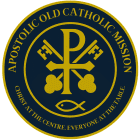Statement of Faith –
What We Believe
Our Statement of Faith – What We Believe
We are a Catholic community in the Old Catholic tradition, grounded in the early Church, centred on Christ, and committed to sacramental grace, apostolic continuity, and pastoral inclusion.
If you are exploring the faith, returning to Church, or seeking a spiritual home, this is a place of grace, truth, and belonging.
This Statement of Faith affirms the following foundational truths:
- We believe in one God—Father, Son, and Holy Spirit, Trinity in unity, unity in Trinity (Matthew 28:19; 2 Corinthians 13:14).
- We confess Jesus Christ as truly God and truly human, born of the Virgin Mary, crucified, risen, ascended, and coming again in glory (John 1:1–14; Luke 1:35; Philippians 2:5–11; Acts 1:9–11).
- We affirm the presence and power of the Holy Spirit in the life of the Church and in every believer (John 14:26; Acts 2:1–4; Romans 8:26–27).
- We uphold the Apostles’ Creed and Nicene Creed as faithful summaries of the apostolic faith (1 Corinthians 15:3–5; 2 Timothy 1:13).
- We recognise the first seven Ecumenical Councils as authoritative for the faith and unity of the Church (Acts 15:28; Ephesians 4:4–6).
- We celebrate the seven sacraments of the Church—Baptism, Eucharist, Confirmation, Reconciliation, Anointing of the Sick, Matrimony, and Holy Orders—as visible means of grace (Matthew 28:19; Luke 22:19–20; John 20:22–23; James 5:14–16; Ephesians 5:31–32; Acts 6:6).
- We maintain apostolic succession through the laying on of hands in valid episcopal ordinations, ensuring the continuity of sacramental life and faithful ministry (Acts 1:20–26; 2 Timothy 1:6; Titus 1:5).
- We understand the Church as one, holy, catholic, and apostolic—a communion of believers across time and space, governed locally and led synodally (Ephesians 2:19–22; 1 Peter 2:9; Acts 15:6–22).
- We welcome all baptised Christians to the Eucharist, affirming the real presence of Christ in the consecrated elements (Luke 24:30–35; 1 Corinthians 10:16–17; John 6:51).
- We honour the dignity of every person, embracing diversity of culture, language, orientation, and background as part of the Body of Christ (Galatians 3:28; Romans 12:4–5; Revelation 7:9).
- We honour Mary and the saints as models of faith, while directing all prayer and worship to Christ alone.
- We affirm the role of conscience, pastoral discernment, and spiritual freedom within the bounds of the apostolic faith (Romans 14:1–5; James 1:5; Galatians 5:1).
- We acknowledge the Declaration of Utrecht (1889) as a faithful expression of the Catholic faith in continuity with the undivided Church.
We profess the faith of the early Church in communion with the whole Body of Christ. We are not Roman Catholic, nor Protestant, but Catholic in the Old Catholic tradition: apostolic in succession, sacramental in worship, and inclusive in spirit. Our ministry, and Statement of Faith, is rooted in the Gospel, guided by the creeds and the first seven ecumenical councils, and expressed pastorally through synodal leadership.
We affirm the Declaration of Utrecht (1889) as a living witness to Catholic faith and governance—upholding valid sacraments, theological integrity, and freedom from papal jurisdiction.
Our clergy are ordained in apostolic succession, and we celebrate the seven sacraments with reverence and continuity, in accordance with the ancient Catholic tradition and historic theology of the Church.
Our motto expresses our mission clearly:
Christ at the Centre. Everyone at the Table.
This is the Statement of Faith we have received, the faith we offer, and the faith we live.
- Read more about the Old Catholic Church and its historical roots.
- Learn how we maintain apostolic succession and sacramental validity in our ministry.
- Visit the About Us page to explore our mission and leadership.
Learn More
Explore foundational teachings, creeds, and documents that underpin the Old Catholic tradition:
- The Declaration of Utrecht (1889) – A historic Old Catholic statement of faith
Read the full text – Fordham University - The Catholic Encyclopedia (1911), “Old Catholics” – Roman Catholic perspective on Old Catholic history and theology
Read article – New Advent - The Nicene Creed (325–381 AD) – Confession of faith used in Old Catholic liturgy
Read version – Anglican Communion - ARCIC: Ministry and Ordination (1973) – An ecumenical dialogue recognising mutual sacramental theology
Read full statement – Vatican.va - Declaration of Lima (1982) – World Council of Churches statement on Baptism, Eucharist, and Ministry
Read at WCC
